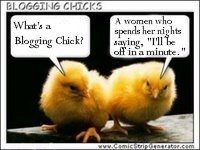More than 550 people gathered in New York to attend the
IDEA Conference: Redefining Creativity, sponsored by Advertising Age and Creativity Magazine. In a real surprise action of free exchange, Advertising Age and Creativity Magazine has posted editorial analyses, photos and excerpts from the speakers at the
IDEA 06 microsite.
For several days, Advertising for Success blog will be posting these highlights and discussing implications for small businesses and online marketers.
1. Limitations and small budgets are inspiring : "I can be at my most creative when I have constraints," said Anne Saunders, senior VP-global brand strategy and communications, Starbucks. The coffee behemoth started out humbly as a small Seattle chain. "When I have a lack of time or money, that causes me to think differently. We don't spend a lot of money on traditional advertising." Less than 2% of Starbucks' operating budget is spent on advertising. Instead, word of mouth and the physical presence of each location have been its best tools.Small businesses and online marketers understand small budgets and other limitations, so this message is worth pondering. Positioning where your product or service is needed, either in bricks or mortar or in the virtual world of online marketing, makes sense.
Word of Mouth (WOM) Marketing is where you may differentiate yourself from your competitors. Never underestimate the power of an angry client or customer. While a satisfied customer may send you 1-5 customers over the years, an unhappy customer or potential customer may blacken your reputation to 50-100 potential clients. The dissatisfaction follows geometric progression.
2. Trust your gut-not research : Pointing out that Steve Jobs didn't create great ideas by doing market research, multilingual ad man David Jones, global CEO of Euro RSCG, exhorted ad execs to stop asking permission. Drawing on British comedian Vic Reeves' assertion that "96.2% of all statistics are made up," Mr. Jones argued that the best ads aren't based on research.
Rather than talking about how to redefine creativity in a fast-changing world, Mr. Jones wants advertising agencies to get out there and do it. David Jones is not a fan of consumer-produced commercials and believes the ad industry must continue to lead the way in marketing. "Our industry cannot delegate the creation of brilliant ideas to consumers. We have to be at the starting point," he said.
He said that makers of ads should see their role as creators of short-form content. According to Mr. Jones, the 30-second TV spot is not dead, it just needs reviving. Drawing on the work of British comedian Vic Reeves, who said "96.2% of all statistics are made up," Mr. Jones argued that some of the most successful ads are not based on research, pre-testing or focus-group results, but on the "gut instinct" of what consumers will like.
For example, Target has been able to thrive and coexist profitably with Wal-Mart while Kmart was bankrupted. This success is attributable to two key factors: the right kind of differentiation and distinctive marketing communications. Target repositioned itself as a mass merchandiser of
affordable chic goods.
3. Think like a band : "What does a band actually do? They create music and they don't know whether it's going to sell," said Chris Stephenson, general manager-global marketing for Microsoft's entertainment business, which launches its much-anticipated MP3-and-video player, Zune, on Nov. 16. "They'll tour-—they're not sitting in an ivory tower behind their desk. It's a very do-it-yourself culture, but ideal. This idea of thinking in a really open-minded, expressive way like an artist is really important."
Become an artist: create, tour and try new ideas. Although listening to this advice given by staid and stiff Microsoft is a bit ludicrous; it is, nonetheless, good advice. Get out amongst your customers and target market. Listen to what they say and what they want. Conduct surveys and informal polls of your website or store visitors, but do not take the results as an absolute. Give your creativity free reign and watch for results.
4. Approach your consumer from a 'molecular level' : The first thing Steven J. Heyer, CEO of Starwood Hotels & Resorts, asks himself when it comes to designing a new hotel is: "What do we want our guest to feel?" He and David Rockwell, founder and CEO of the Rockwell Group, discussed the innovations they've made to the luxury-hotel industry by designing experiences that appeal to the traveler who hates traveling but loves being there-—think mountain views, health spas and expanded bars.
"The customer's perception is your reality," according to
Kate Zabriskie of Business Training Works. We do not view ourselves as Coach class seat or Gardenview room people. We all strive to be more and to want more bang for our buck. We want the glorious view, the fruit basket and homemade cookies, the concierge level treatment. Your mission, if you accept it, is to deliver this service on a shoestring budget.
Well, that is probably enough creativity to digest in one day. Besides for blockquotes and any text marked with quotations marks, which are word for word from the
IDEA micro site, the thoughts are mine. Feel free to comment upon or continue this discussion in the comment area.
Tags:
IDEA Conference,
Refining Creativity,
Advertising Age,
Creativity Magazine,
gut marketing,
small budget marketing,
just do it,
molecular level marketing,
think like a band
















